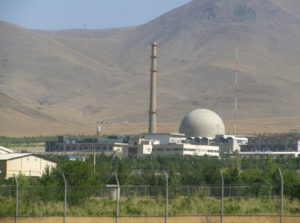By Samuel Hickey
 On January 30, the Trump Administration extended four nuclear waivers allowing Russia, China and the UK to continue their work to restrain Iran’s nuclear program. While this move is good for American security, there are Iran hawks in the Senate who advocate rescinding all waivers related to the 2015 Joint Comprehensive Plan of Action (also known as the Iran nuclear deal).
On January 30, the Trump Administration extended four nuclear waivers allowing Russia, China and the UK to continue their work to restrain Iran’s nuclear program. While this move is good for American security, there are Iran hawks in the Senate who advocate rescinding all waivers related to the 2015 Joint Comprehensive Plan of Action (also known as the Iran nuclear deal).
Following the Trump Administration’s 2018 abandonment of the Iran nuclear deal, these remaining waivers are the last vestige of the U.S. commitment to the agreement. By issuing waivers, the United States has agreed not to sanction any companies in relation to four activities:
1) Transfer of fuel to the Tehran Research Reactor (Russia)
2) Activities at the Bushehr reactor, including fueling (Russia)
3) Modification of the Arak heavy water research reactor (China and the UK)
4) Transfer of spent nuclear fuel out of Iran (Russia)
THE FIRST TWO WAIVERS – BLOCKING POLITICAL COVER FOR ENRICHMENT
The first waiver allows Russia to transfer fuel to the Tehran Research Reactor, which is powered by 20% enriched uranium. Iran is not allowed to enrich uranium to this level on its own under the nuclear deal. However, since May 2019, Iran has increased its enrichment levels in response to the United States leaving the nuclear deal and imposing punishing sanctions. If this waiver were not issued, it would provide Iran greater political cover to enrich to that much higher level.
Similar to the first waiver, the second waiver allows Russia to support activities at the Bushehr nuclear power reactor (including fueling). The Bushehr reactor is strictly for energy, but to fuel it without Russian assistance, Iran would need to increase its level of enrichment beyond what is allowed under the nuclear deal. With these waivers, there is no peaceful reason for Iran to breach the enrichment limits under the deal.
THE LAST TWO WAIVERS – PREVENTING PLUTONIUM PRODUCTION
The third waiver allows China to modify the Arak heavy water research reactor under the supervision of the United Kingdom. As originally designed, the Arak reactor posed a significant proliferation threat, so the nuclear deal sought to defuse this issue. According to Colin Kahl, Deputy Assistant to President Barack Obama and National Security Advisor to Vice President Joe Biden, the Arak reactor could have produced enough plutonium from its spent fuel for one or two nuclear weapons per year. Under the new design, the reactor will be limited to half of its original power and it will only use fuel enriched to 3.67%, further removing the need for Iran to enrich past this level.
The fourth waiver ensures all spent fuel will be shipped out of Iran. As much as international safeguards have improved, stocks of spent fuel represent a threat to nuclear security and possibly a proliferation threat. However, this measure ensures that Iran does not have the material to separate plutonium and that all spent fuel is reported, ensuring greater accountability.
THE POLITICS OF WAIVERS
When President Donald Trump withdrew from the Iran nuclear deal, he returned all sanctions “lifted or waived” in connection with the deal on Iran. In his haste to leave the deal, the President neglected to consider the full ramifications for the global oil market and the United States’ national security. A new set of waivers was issued to help manage the political fallout related to the U.S. withdrawal. These waivers enabled the continuation of specific oil exports to U.S. allies and partners, and work related to nuclear projects in Iran.
By May 2019, “maximum pressure” sanctions applied to all Iranian oil exports and the Trump Administration began rescinding nuclear waivers. As a result:
- Iran cannot ship stockpiled enriched uranium to Russia. (This prohibition is partly why the Iranian uranium stockpile is growing.)
- Iran cannot ship heavy water to Oman. (Iran is now inadvertently breaching the nuclear deal.)
- Russia cannot convert the underground facility at Fordow – a hardened bunker that holds centrifuges – into a facility for nuclear physics and technology. (This has resulted in less oversight at Fordow.)
With only four waivers left, the Trump Administration faces pressure from some of its strongest validators to rescind them all. Senators Ted Cruz and Lindsay Graham introduced legislation to block the extension of any remaining waivers. Internally, the split is between Treasury Secretary Steven Mnuchin, who favors extension, and Secretary of State Mike Pompeo, who reportedly opposes it. The next deadline for extension is March 30, 2020, so the pressure is rising.
